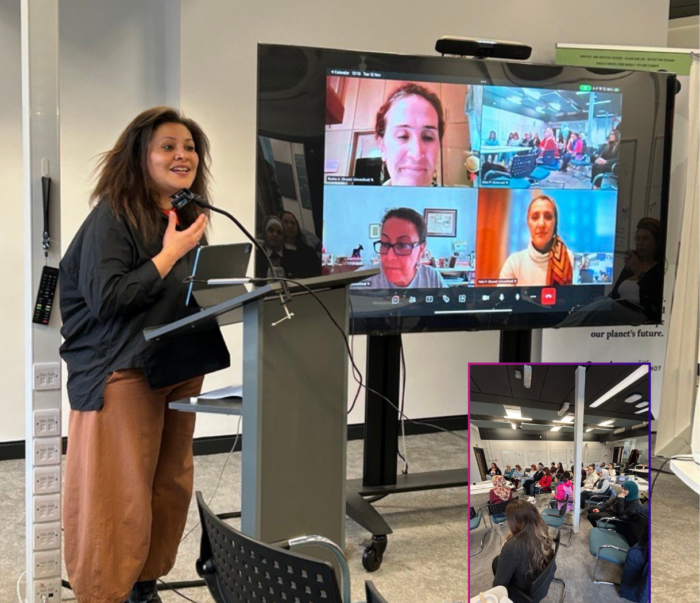LSSI Hosts Transformative Event with Œcumene Spaces for Dignity: Ethical and Power Dynamics in Urban Co-Production

Leeds Social Sciences Institute (LSSI) continues its series of thought-provoking training events by delving into co-production methodologies, this time in collaboration with Œcumene Spaces for Dignity. This innovative network included architects, planners, researchers, and changemakers from MENA and Africa, championing the power of collective intelligence. Through co-design and co-construction, they reimagine narratives, foster dialogue, empower communities, and build spaces for coexistence.
A Global Collective Driving Change
Œcumene Spaces for Dignity and its affiliates, including the Œcumene Studio for Integrated Planning and Sustainable Design, form a dynamic ecosystem of NGOs, social enterprises, and practitioners. These groups engage in co-creation efforts across architecture, urban sciences, and art, supporting local actors and development professionals to advance research, design, and co-production practices.
Setting the Stage for Dialogue
The workshop opened with remarks from Professor Gehan Selim, Hoffman Wood Professor of Architecture at the University of Leeds and Deputy Director of LSSI. Professor Selim introduced the University’s Co-Production Network, which seeks to bridge academic knowledge with real-world expertise, emphasising the importance of collaboration beyond academic walls.
Participants were introduced to Insaf Ben Othmane Hamrouni, Founder and Executive Director of Œcumene Spaces for Dignity. Based in Dublin, Tunisia, and Egypt, Insaf is a multilingual architect, urban planner, and participation expert passionate about fostering resilience and sustainability. Her powerful presentation highlighted co-production’s historical roots in grassroots movements and its evolution into participatory design practices. She engaged attendees in an emotional exploration of ethical decision-making, revealing how such processes are deeply intertwined with human emotions like joy, anger, fear, and sadness.
Insights from Practitioners and Researchers
The morning session continued with Layla Zibar, a postdoctoral researcher at KU Leuven University, specialising in inclusion, forced migration, and urbanism. Drawing on her fieldwork in refugee camps in Iraq, Layla shared her eye-opening experiences of vulnerability and resilience. She described how refugees, using limited materials, created homes and facilities, showcasing their adaptability and construction skills even under extreme conditions.
Global Perspectives on Local Challenges
The afternoon session featured a series of international speakers, each highlighting unique challenges and solutions in their regions:
- Leila Ben-Gacem, founder of Blue Fish in Tunisia, shared the inspiring story of Mdinti, a collective initiative uniting diverse actors within Tunis’s medina, including artisans, restaurateurs, guesthouse owners, and booksellers. This group of economic stakeholders co-created a vibrant network to revitalise the medina, aiming to establish a fresh cultural and economic dynamic that adds value and attracts interest to the area. Their efforts have enhanced safety for women and children and repurposed abandoned spaces into thriving community gardens. These initiatives have empowered local residents by equipping them with new skills and fostering a more profound sense of belonging.

- Alessandra Gola from the Yalla Project in Nablus, Palestine, showcased their multifaceted approach to community resilience through building renovation, cultural and social events, and academic collaboration. The Yalla Project operates as a deskless collective of architects, researchers, craftsmen, and social entrepreneurs, united by a commitment to preserving heritage and fostering a sense of identity in crisis-affected communities.
- Their work in building renovation focuses on restoring spaces that hold historical and cultural significance, preserving the memory and identity of the local population. Through cultural and social events, they engage the community in storytelling, art, and collective experiences, reinforcing a shared sense of belonging. The project also prioritizes academic collaboration and research, connecting with universities and experts to develop innovative methods for emergency construction and sustainable design.
- By integrating diverse expertise and prioritizing community needs, the Yalla Project not only saves architectural heritage but also empowers people to reclaim their identity and build a self-sustaining future, even in challenging contexts.

- Rasha Arous, a civil engineer and urban planner from Egypt and a former project manager with UNHCR, shared her invaluable insights on navigating the complexities of development projects. Drawing from her extensive experience, she highlighted the delicate balance required to address competing interests such as political agendas, environmental sustainability, and community needs. Her reflections encouraged attendees to critically examine the ethical compromises often encountered in urban planning, emphasising the importance of inclusive and thoughtful decision-making to achieve equitable and sustainable outcomes. Crafting Ethical Co-Production Strategies
In the workshop’s final session, attendees participated in interactive scenarios simulating ethical dilemmas. From navigating the social impacts of luxury developments to balancing environmental preservation with infrastructure needs, participants stepped into the roles of diverse stakeholders. These exercises illuminated the complexities of ethical co-production, fostering a deeper understanding of its challenges and rewards.
Reflections and Takeaways
The event concluded with a discussion of key insights for ethical urbanism. Feedback from attendees was overwhelmingly positive, with many praising the event’s blend of theoretical exploration and practical application.
LSSI extends its gratitude to the speakers, participants, and organisers, including Natalie Jackson and Elliot Payne, for making this event a success.
Stay Connected
To stay informed about LSSI’s latest events and initiatives, subscribe to our newsletter and connect with us on LinkedIn, BlueSky, or YouTube. You can also join the Co-Production Network at the University of Leeds by clicking here.
